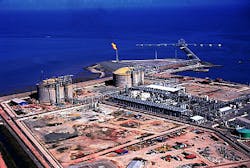Atlantic LNG on stream; expansion planned
Atlantic LNG Co. of Trinidad & Tobago's complex at Port Fortin, Trinidad and Tobago, is the first grassroots liquefied natural gas export project to start up in the Western Hemisphere in more than 30 years. Photo courtesy of Atlantic LNG Co.The Atlantic LNG Co. of Trinidad & Tobago has loaded the first cargo of liquefied natural gas from its export plant at Point Fortin, Trinidad and Tobago.
The first cargo was loaded Apr. 19 for the project, the first grassroots LNG export project in the Western Hemisphere in more than 30 years. It is also said to be the largest single capital investment ever made in the Caribbean basin.
Yet while LNG production has only just begun at the 3 million metric ton/year, single-train plant, the operating joint venture is already negotiating with the Port of Spain government to expand the project.
Project details
The Atlantic LNG plant and marine facilities were built at a cost of almost $1 billion and incorporated the optimized cascade liquefaction process, developed and licensed by Phillips Petroleum Co. (OGJ, Oct. 20, 1997, p. 52).Atlantic LNG interest holders are Amoco Trinidad (LNG) BV 34%, British Gas Trinidad LNG Ltd. 26%, Repsol LNG Port Spain BV 20%, Cabot Trinidad LNG Ltd. 10%, and state firm NGC Trinidad & Tobago LNG Ltd. 10%.
The plant's gas is being sold under long-term contracts, 60% going to Cabot LNG Corp. on the U.S. northeast coast and 40% to Spain's Enagas SA. The first ship to load was Cabot's Matthew LNG carrier.
The LNG train started production Mar. 15. This initial output was used to cool and fill the storage tanks at Point Fortin.
Overseas Bechtel Inc. managed engineering, procurement, and construction work on the project.
Expansion eyed
Martin Houston, vice-president of LNG at BG plc, told OGJ that Atlantic LNG is discussing with government a potential two-train expansion of the plant, which would increase the project's capacity by 7.2-8.1 million tons/ year.Houston said the first train is fed by gas from Amoco fields off Trinidad, but that both BG and Amoco plan to supply gas for the two future trains.
BG already produces gas from Dolphin field off Trinidad, with output being transported via pipeline to shore for use in local ammonia and methanol production and as fuel at a steel plant.
In the last 2 years, BG has been working towards development of a number of other finds off the islands. The Poinsettia discovery, to the north of Trinidad, is earmarked to be developed first by BG (OGJ, Apr. 14, 1997, p. 24). Recently, the company has been evaluating the Dolphin Deep and Starfish finds off the east coast.
Houston said BG has plenty of reserves to support the expanded Atlantic LNG project. It already has proved up a total 1.7 tcf of gas and sees the potential for reserves amounting to 10 tcf on its eastern blocks and 4 tcf to the north.
The development of the north coast fields will begin once Atlantic LNG gives the go-ahead for the second train at Point Fortin. Houston hopes for an investment decision this year. The east coast fields will be developed later to support the third train.
This year, BG plans to drill one appraisal well and a rank wildcat off Trinidad, using the Santa Fe 135 semisubmersible, which recently set sail from the U.K.
LNG process, gas sales
Houston said the original decision to use the Phillips LNG process was based on cost reasons, although the venture is keen to encourage competition at the bidding stage with the dominant Air Products Inc. LNG process.Atlantic LNG is still "open-minded" about which process would be used for the planned additional trains, while noting the potential for synergy in using the Phillips process for these.
The venture is negotiating with customers in the U.S. and Spain for sales of gas from the planned new trains. Houston said Atlantic LNG is in talks with a number of U.S. gas suppliers, along with Enagas and Spain's Repsol SA.
BG is also evaluating the prospects for exporting LNG to Northeast Brazil, where it is developing gas supply assets (see related story, p. 28).
Gerarld Peereboom, Atlantic LNG's president, is optimistic about the project's future despite a recent downturn in oil and gas prices.
"We still see a long-term upwards trend in prices, and are convinced that the government and people of Trini- dad and Tobago will reap significant benefits, not only from this plant, but from any future expansion as well," he said.
Copyright 1999 Oil & Gas Journal. All Rights Reserved.
